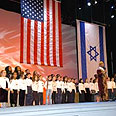
American Jews face dilemma
How should US Jewish community relate to Israel's Arabs?
PM Olmert and six ministers of his government will show their solidarity with American Jewry when attending this week in Los Angeles the General Assembly, the flagship event of the United Jewish Communities in North America. These are good days: In the past, Israelis were used to leaders of the Jewish American community coming over here to show solidarity, yet now almost one third of the Israeli government fly away to provide their support to American Jews, as if there are no more any urgent matters here.
But apart of some snide remarks on the out of the way readiness of Israeli policymakers to mingle with potential donors, the General Assembly is hardly a matter of public attention in Israel, making its way to the back pages of our local newspapers. This is hardly surprising: A recent study sponsored by the Israeli/Middle East office of the American Jewish Committee shows Israeli high-school students to be alarmingly ignorant about history and politics of the Jewish community in the United States.
This year’s GA convenes in the aftermath of the second Lebanon war, and deliberately the GA agenda focuses a great deal on its repercussions. The war provided Israelis with a vivid signal that the American Jewish community is still much needed - or rather, its financial and political resources. An unprecedented amount of USD 350 million has been raised in record time to help out a country in crisis. But the urgency had another effect: It brought to the surface challenging questions about differences of agendas between Americans and Israelis and about the nature of Jewish American solidarity with Israel.
Helping Jews and non-Jews
The vast Arab population in Israel's north was hit hard by the war. Mainstream Jewish organizations had to face the question of how to distribute the money between Jews and non-Jews in need. No more an abstract intellectual dilemma, immediate relief given to non-Jews was quickly followed suit by accusations by some Americans that Jewish money should not be channeled to non-Jewish causes. On the other hand, voices in liberal America echoed the plea by the Israeli Left to change long standing priorities and start helping out the Arabs on a grand scale.
Whatever the compromise reached on how to distribute the funds raised, the major question has only been slightly touched upon: What shape should American Jewish solidarity with Israel take when approximately a fifth of Israel's population is not Jewish?
Two main reasons make this especially a tough call to answer. First, it forces Americans to reflect on their reasons for solidarity with Israel. American Jews seek new paths in which to channel their energy, and they find new symbols to gather round; although in time of distress, as in the recent war, the always prevailing instincts of the clan are still strong enough to convene everybody round the same old bonfire. But when the echoes of the drums fade and become mere reflections of past time glory, the differences in agendas and in values cannot be dismissed.
Secondly, it is a tough call because Israeli society and political institutions have started facing the fact that Israel is not purely Jewish and will never be. It is true, slogans about Arabs enjoying equal rights in the Jewish-democratic state still prevail, but what this equality means and how democracy should manifest itself are yet to be seen.
The invitation of Arab Member of Knesset Nadia Hilou to address a session at the GA regarding “The Impact of the War on Jewish-Arab Relations in Israel” only accentuates the difficulty American Jews face. MK Hilou is a member of the Labor party, the senior partner in PM Olmert’s coalition, and the same party that has just welcomed, albeit halfheartedly, MK Avigdor Lieberman as the minister for strategic threats.
The United Jewish Communities that organizes the GA knows well that it is more appropriate to invite politically correct MK Hilou, an Arab MK from a Zionist party, rather than newly elected minister Lieberman who has constantly called for the denaturalization of Israeli Arabs. However, if American Jewry would like to finally face what it means to show solidarity with Israel today, it should consider making adjustments on the panel. Regretfully, this will give them a much better picture of the situation in Israel after the second Lebanon war.
The writer is LGBT Coordinator of Young Meretz










